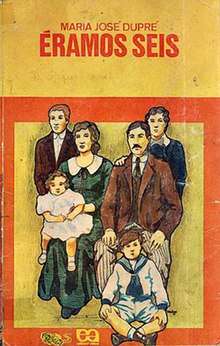Éramos Seis
Éramos Seis ("We Were Six") is a 1943 Brazilian novel by Maria José Dupré about a struggling middle-class family in São Paulo.[1] Praised by writer and critic Monteiro Lobato, it became a best-selling novel and was awarded the Raul Pompeia Prize for best work of 1943 by the Brazilian Academy of Letters.[1] Dupré published a sequel called Dona Lola in 1949.[1]
 Classic cover of the paperback edition | |
| Author | Maria José Dupré |
|---|---|
| Country | Brazil |
| Language | Portuguese |
| Genre | Novel |
| Published | 1943 |
| Media type | |
| Followed by | Dona Lola |
Éramos Seis has been adapted as a telenovela five times, in 1958, 1967, 1977, 1994 and 2019.
Plot
Éramos Seis chronicles the struggles of a middle-class family in São Paulo through the eyes of its matriarch Dona Lola.[1]
Reception
Éramos Seis was praised by writer and critic Monteiro Lobato and became a best-selling novel.[1] It was awarded the Raul Pompeia Prize for best work of 1943 by the Brazilian Academy of Letters.[1] Darlene Joy Sadlier writes that Lola's "strength, good humor, love, and ingenuity make for a compelling image of the 'ordinary' wife and mother."[1] She notes that the novel's title is poignant because Lola's husband dies halfway through and the family subsequently disintegrates.[1] The popularity of Lola with the Brazilian public prompted Dupré to publish the sequel Dona Lola in 1949.[1]
Adaptations
To date, Éramos Seis has been adapted for television five times. It was first presented as a telenovela by Rede Record in 1958.[2] The novel was next adapted twice by Rede Tupi in 1967[3] and 1977,[4] and by Sistema Brasileiro de Televisão in 1994. Finally, it was adapted by Rede Globo in 2019.
References
- Sadlier, Darlene Joy (February 1, 1992). One Hundred Years After Tomorrow: Brazilian Women's Fiction in the 20th Century. Indiana University Press. pp. 58–75. ISBN 0-253-35045-X. Retrieved February 9, 2010.
- Éramos Seis (1958) on IMDb
- Éramos Seis (1967) on IMDb
- Éramos Seis (1977) on IMDb